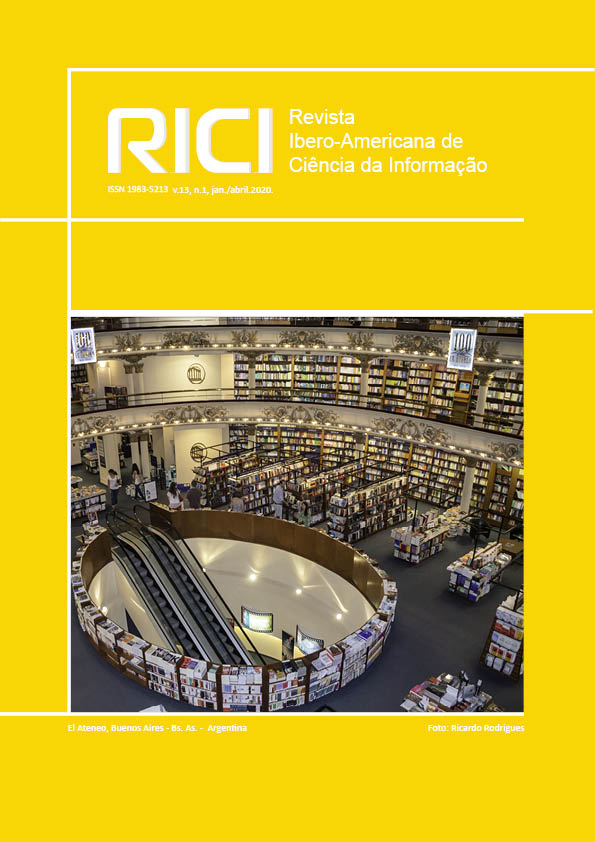The use of digital technologies in art museums the case of the Museo Nacional Centro de Arte Reina Sofía: rethinking Guernica
DOI:
https://doi.org/10.26512/rici.v13.n1.2020.29502Keywords:
digital Technologies. Art museum. digital humanities. Museo Nacional Centro de Arte Reina Sofía.Abstract
The Museo Nacional Centro de Arte Reina Sofía (Madrid, Spain) admittedly uses digital technologies to foster access and diffusion of its collections. This paper presents a specific project from the Museum: Repensar Guernica, website that, through the conjunction of the processes that underlie the museum and the archive, adds as much information as possible about the Pablo Picasso's masterpiece Guernica. The platform goal is to achieve a general audience, from Art History specialists to more varied curious about the subject. As of the Repensar Guernica case study, we prove how digital tools, as virtual exhibitions, online catalogs, and portals, are fundamental to improve and to democratize access for museum collections and archives. The methodology uses the bibliographical review about the digital technologies in the museums and has in mind some issues from the Digital Humanities, like the impact caused by the technology on the preservation of traditional sources of research.
Downloads
References
ALMEIDA, Marco Antônio de; DAMIAN, Ieda Pelógia Martins. Humanidades Digitais: um campo praxiológico para mediações e políticas culturais? In: Anais. Encontro Nacional de Pesquisa em Ciência da Informação, 16, João Pessoa: ANCIB, 2015. n.p. Disponível em: <http://www.ufpb.br/evento/index.php/enancib2015/enancib2015/paper/view/2999>. Acesso em: 29 out. 2019.
BOTALLO, Marilúcia. Diretrizes em Comunicação Museológica. In: Associação Cultural de Amigos do Museu Casa de Portinari. Documentação e Conservação de Acervos Museológicos : diretrizes. Brodowisk: Associação Cultural de Amigos do Museu Casa de Portinari; Secretaria de Estado da Cultura de São Paulo, 2010.
CÂMARA, Sérgio Antonio; BENICIO, Milla. História digital: entre as promessas e armadilhas da sociedade informacional. Revista Observatório, v. 3, n. 5, p. 38-56, ago. 2017. Disponível em: <https://sistemas.uft.edu.br/periodicos/index.php/observatorio/article/view/3596>. Acesso em: 20 out. 2019.
CON "REPENSAR GUERNICA. HISTORIA Y CONFLICTO DEL SIGLO XX" EL BIG DATA SE VUELVE FUNCIONAL AL ARTE. Revista Digital Nueva Museología. Madrid: 14 nov. 2017. Disponível em: <https://nuevamuseologia.net/con-la-web-repensar-guernica-historia-y-conflicto-del-siglo-xx-el-big-data-entra-de-lleno-en-el-arte/>. Acesso em: 3 nov. 2019.
CASTELLS, Manuel. Os museus na era da informação: conectores culturais de tempo e espaço. Musas: Revista Brasileira de Museologia, Brasília, v. 7, n. 5, p. 8-21, 2011. Disponível em: <https://www.museus.gov.br/wp-content/uploads/2015/01/Revista-Musas-5.pdf>. Acesso em: 30 jul. 2018.
DESVALLÉES, André; MAIRESSE, François. Conceitos-chave de Museologia. São Paulo: Comitê Brasileiro do Conselho Internacional de Museus; Pinacoteca do Estado de São Paulo; Secretaria de Estado da Cultura, 2013.
DODEBEI, Vera. Cultura e patrimônio na era da informação. In: MARINGELI, Cristina Ayres da Silva (org.). IV Seminário Serviços de Informação em Museus: informação digital como patrimônio cultural. São Paulo: Pinacoteca de São Paulo, 2017, p. 81-90.
MAGALHÃES, Ana Gonçalves. Considerações para uma análise histórico-crítica da catalogação de acervos artísticos. In: BEIGUELMAN, Gisele; MAGALHÃES, Ana Gonçalves. Futuros possíveis: Arte, museus e arquivos digitais. São Paulo: Petrópolis, 2014, p. 34-43.
NOIRET, Serge. História pública digital. Liinc em Revista, Rio de Janeiro, v. 11, n.1, p. 28-51, mai., 2015. Disponível em: < http://revista.ibict.br/liinc > Acesso em: 30 jul. 2018.
PADILHA, Renata Cardozo; CAFÉ, Ligia; SILVA, Edna Lucia da. O papel das instituições museológicas na sociedade da informação/conhecimento. Perspectivas em Ciência da Informação. Belo Horizonte, v. 19, n. 2, abr./jun., p. 68-82, 2014. Disponível em: <http://portaldeperiodicos.eci.ufmg.br/index.php/pci/article/view/1889/1395>. Acesso em: 20 out. 2019.
PIMENTA, Ricardo Medeiros. Os objetos técnicos e seus papéis no horizonte das humanidades digitais: um caso para a Ciência da Informação. Revista Conhecimento em Ação, Rio de Janeiro, v. 1, n. 2, jul/dez., p. 20-33, 2016. Disponível em: <https://revistas.ufrj.br/index.php/rca/article/view/20>. Acesso em: 20 out. 2019.
TARDY, Cécile. A mediação de autenticidade dos substitutos digitais. In: TARDY, Cécile; DODEBEI, Vera. Memória e novos patrimônios. Marseille: OpenEdition Press, 2015.
THATCAMP. Manifesto das humanidades digitais. Paris: ThatCamp [The Humanities and Technology Camp]. 2011. Disponível em: <https://tcp.hypotheses.org/497>. Acesso em: 3 nov. 2019.
TELLES, Helyom Viana. História digital, sociologia digital e humanidades digitais: algumas questões metodológicas. Revista Observatório, v. 3, n. 5, p. 74-101, ago., 2017. Disponível em: <https://sistemas.uft.edu.br/periodicos/index.php/observatorio/article/view/3810>. Acesso em: 20 out. 2019.
VELLOSILLO, Arianne Vanrel. Estratégias de conservação e humanidades digitais. In: BEIGUELMAN, Gisele; MAGALHÃES, Ana Gonçalves. Futuros possíveis: Arte, museus e arquivos digitais. São Paulo: Petrópolis, p. 135-146, 2014.
ZORICH, Diane. Transitioning to a Digital World: Art History, its Research Centers, and Digital Scholarship. Journal of Digital Humanities. Fairfax, v. 1, n. 2, March/May 2012. Disponível em: <http://journalofdigitalhumanities.org/1-2/transitioning-to-a-digital-world-by-diane-zorich/>. Acesso em: 3 nov. 2019.
Downloads
Published
How to Cite
Issue
Section
License
Copyright Notice
Authors who publish in this journal agree to the following terms:
- Authors retain copyright and grant the journal right of first publication with the work simultaneously licensed under the Creative Commons Attribution License 4.0, allowing the sharing of work and recognition of the work of authorship and initial publication in this journal.
- Authors are able to take on additional contracts separately, non-exclusive distribution of the version of the paper published in this journal (ex.: distribute to an institutional repository or publish as a book), with an acknowledgment of its initial publication in this journal.
- Authors are permitted and encouraged to distribute their work online (eg.: in institutional repositories or on their website) at any point before or during the editorial process, as it can lead to productive exchanges, as well as increase the impact and citation the published work.
















